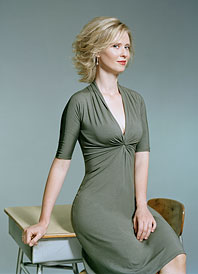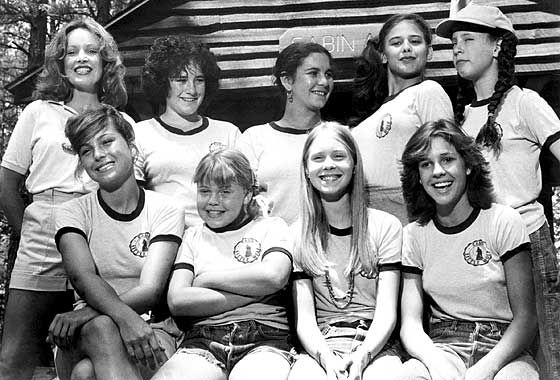
It’s a rainy September afternoon, the first day of the school year, and Cynthia Nixon offers me her umbrella. She’s dressed in a funky T-shirt with a print of the Indian god Ganesh, a fur-collared jacket, and split-toe shoes that make her feet look like rubbery hooves. Unlike her former castmates Sarah Jessica Parker and Kim Cattrall—whose Sex and the City characters cling to them like a persistent perfume—Nixon in person has no whiff of the tightly wound Miranda Hobbes. Instead, she’s girlish and delicate and loose-limbed.
Nixon has come from rehearsals for The Prime of Miss Jean Brodie, the sixties revival in which she plays the title role—a juicy anti-heroine part associated with such nonentities as Vanessa Redgrave, Fiona Shaw, Zoe Caldwell, and Maggie Smith. (Nixon recently had a dream that she ran into Shaw, who sneered at her.) It’s all part of the de-Mirandafication process Nixon, 40, has undertaken since Sex and the City ended nearly three years ago, including a much-heralded performance as Eleanor Roosevelt in the HBO movie Warm Springs and her Tony- winning turn as a grieving mother in Rabbit Hole—a series of career gambits aimed at transforming her from an icon back into the classic New York actress she was before she became Ms. Hobbes.
“It’s so unconscious, a lot of it,” she marvels when I ask her what she likes about Jean Brodie, the tale of a Fascism-loving schoolmistress who inspires and bullies her chosen clique of girls. “There are all these big forces at work—sex and politics—but they’re kind of subterranean. The people have a certain awareness, but most of it’s buried.”
Somewhere in our fumbling early conversation, the waitress arrives with menus and a gushing, sincere monologue: She never does this, she explained, but Nixon is her hero; she’s not even an actress and she’s not talking about Sex and the City—she’s talking about Cynthia Nixon’s entire career. She remembers back in 1984, hearing about the then-18-year-old actress’s breakthrough accomplishment, when she appeared on Broadway in two productions simultaneously: Tom Stoppard’s The Real Thing and David Rabe’s Hurlyburly. “You’re the reason I came to New York,” she concludes, beaming.
“Thank you,” Nixon responds. She’s gracious and she’s direct, but she doesn’t engage. And then she snaps right back to our discussion without further comment.
Nixon has been famous one way or another since she was a teenager. A native New Yorker, she went to Hunter College High School and Barnard. At age 12, she played a teen hippie in Little Darlings. And she’s gained a reputation as a true New York famous person: the kind of celebrity who actually seems to be part of the world she lives in, who takes the bus, who advocates for the public-school system. She lives on the Upper West Side, and the morning of our interview, she dropped off her daughter for her first day at a public middle school. Since she’s playing a teacher herself, I restart our conversation by asking for a bit of educational advice.
“If you make the decision to send your kid to public school,” she advises, “don’t even look at private schools. Just shut the door. Just turn off the TV. And then you don’t even have to worry about preschool. You have to worry about what’s good for your kid, but you don’t have to worry about how to position yourself.”
I wonder whether her growing fame led her to consider a private school for her kid, despite her political beliefs, and she flattens her lips and shakes her head: No, no, no, no. “In a school where everyone is famous or rich or whatever, you have a culture,” Nixon explains. “ ‘What does your dad do?’ ‘What does your mom do?’ Of course, I’m not saying my daughter doesn’t feel a little like a freak because she has a famous mom. At school this morning, she was like, Go, just go, just go. Which is a kid thing anyway, but you know—I attract attention. When you’re 9, you don’t want that.”
And this, finally, brings us directly to “the lesbian thing”—which may be the reason you’re reading this in the first place and which has been the subterranean aspect of our conversation all along. Because in 2003, Nixon ended her relationship with Danny Mozes, the father of her two children, Samantha and Charles. The couple had met in high school, and they’d never married. Then she got involved with Christine Marinoni, a Park Slope institution and a public-school advocate (although Nixon tells me Marinoni has since switched to union organizing). The result? An explosion of attention for an actress who had long floated in a celebrity sweet spot, famous enough to have adoring fans but private enough to have ducked most tabloid interest.

When I steer conversation toward the subject, she stutters a bit finding her way in. “I felt like, I feel like, here’s what I feel: I feel like there was an enormous temperature spike, where I was on the front page of two daily papers, there was paparazzi outside my house. My girlfriend had English press on her parents’ lawn. Every person she went to high school with got a phone call. They bought her yearbook. They almost put me on the cover of People magazine. And then it died. Because there wasn’t really anything to say. I can’t remember in what context they tell people this, but if someone is chasing you, stop running. And then they’ll stop chasing you.”
She’s done something perversely radical: She’s made her own coming-out story boring.
That’s because it isn’t a coming-out story at all, she insists. “I never felt like there was an unconscious part of me around that woke up or that came out of the closet; there wasn’t a struggle, there wasn’t an attempt to suppress. I met this woman, I fell in love with her, and I’m a public figure.”
The truth is, Cynthia Nixon has managed to do something perversely radical with her gossip emergency: She’s made her own coming-out story boring. She mentions her girlfriend in conversation, but in a way that makes it at once not a big deal and nobody’s business. She is both evasive and open, the way anyone sane would be with a stranger asking nosy questions. (And she’s very skilled at making me feel like a jerk for asking the more prying ones, with another facial expression: No, no, no, no.)
Another celebrity could’ve done this and it might feel standoffish and aloof, a bit disingenuous. But while Cynthia Nixon may not be much like Miranda, she does possess her most famous character’s ability to make a defensive stance a likable, admirable one. Someday, she says, she needs to sit down with Christine and watch a marathon of Sex and the City, which her girlfriend has barely seen. Nixon loves the TV series that she must also be very sick of. But even more so, she says, she’s a fan of the original book by Candace Bushnell. “It’s very depressing, very dark, very grim,” she says admiringly. “It was so grotesque. It was, like, who are these people? I believe these people exist, and either I’ve never met them or I’ve never met them well enough to know them. And I’m just so glad there’s Plexiglas between them and me.”